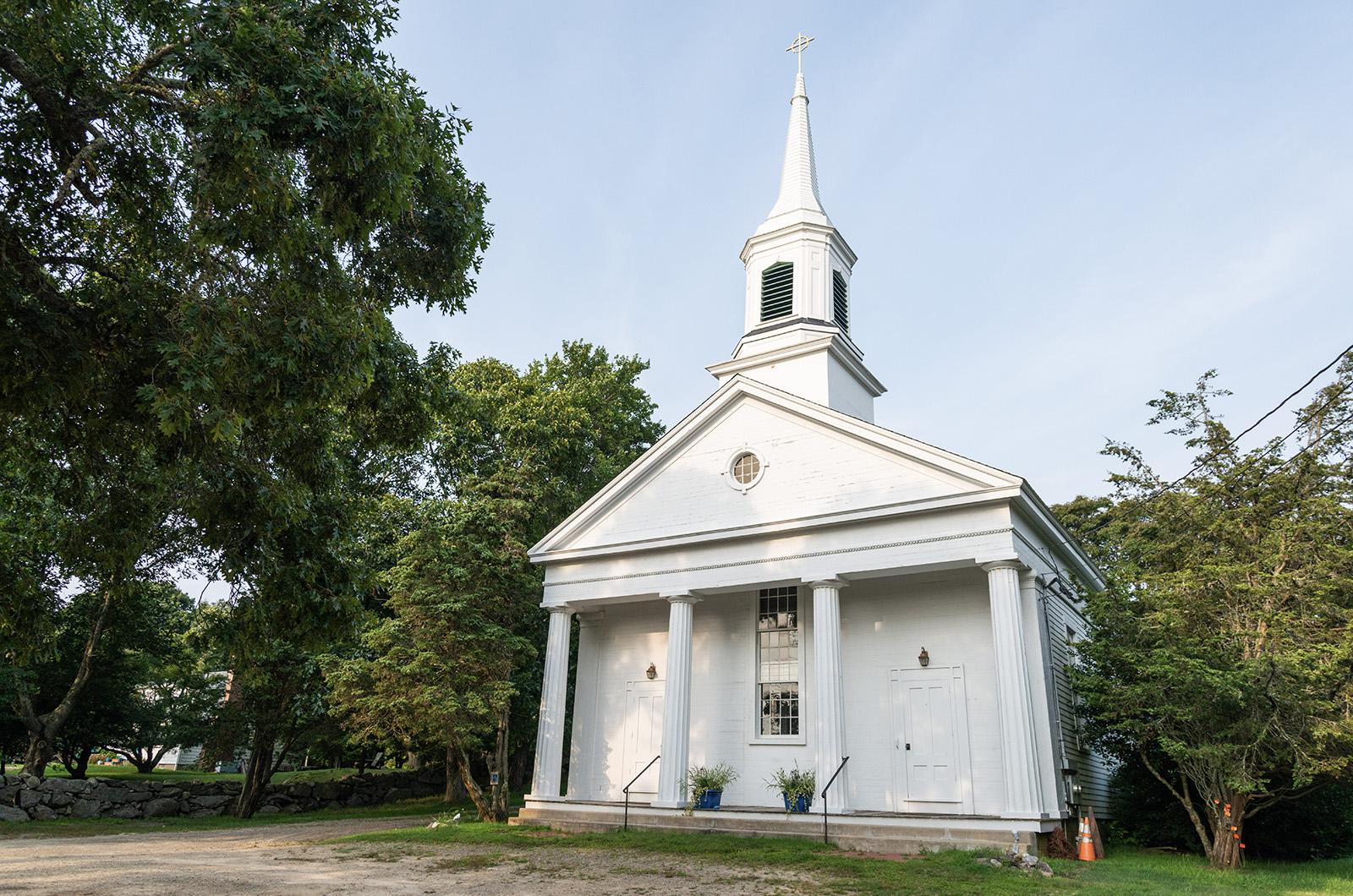The Chilmark Community Church is looking to sever its ties with the United Methodist Church, and the Island congregation recently filed a lawsuit in order to secure its 1.6-acre church grounds on Menemsha Crossroad.
The 100-person congregation in Chilmark has talked about leaving the United Methodist Church going back four years, joining a trend of more than 6,000 churches that have exited the overarching organization since 2019.
Earlier this year, the Chilmark church unsuccessfully asked to disaffiliate from the United Methodists. Soon after, the Island church filed a lawsuit in state Land Court on August 10 against the New England Annual Conference of the United Methodist Church, staking the Chilmark church’s claim to its church, parsonage and land.
The property in question has been owned and maintained by the Chilmark congregation for more than a century, according to the church’s lawsuit.
“The church itself is 100 per cent behind this legal action,” said Rev. Dr. Charlotte Wright, the interim minister at Chilmark Community Church. “And they’re 100 per cent behind separating from the United Methodist Church.”
The Chilmark Community Church asked the court to confirm that the property title is only in the name of Chilmark Community Church and not controlled in any part by the New England Conference of the United Methodist Church.
At the New England Conference’s annual meeting in June, Chilmark Community Church was one of 15 churches hoping to break away from the United Methodist Church.
Its attempted exit is one of a larger movement away from the wider Methodist organization. Many churches’ disaffiliations were spurred by disagreements over theology and the role of LGBTQ+ clergy at a global meeting of the United Methodists in 2019. There, proposals to make the Methodist church rules, known as the Book of Discipline, more inclusive of LGBTQ+ church members were rejected.
At the same global meeting, a rule was passed to allow congregations wanting to leave the United Methodist Church to complete steps to disaffiliate by December 31, 2023, and legally retain their churches’ property.
The Chilmark congregation has discussed leaving the United Methodist Church since 2019, Carolyn Stoeber, a member of the church, said while presenting the resolution to disaffiliate to the New England conference.
A series of obstacles prevented it from doing so within the timeline required to meet the December deadline, as the church’s minister from 2019 to April 2022 wouldn’t engage with the conversation. After his departure, the church prioritized finding a new minister and missed a deadline to ask the New England Conference for formal recognition of its intent to exit, Ms. Stoeber said.
Resolutions from 14 churches to conditionally disaffiliate were jointly approved at the conference in June. Chilmark Community Church’s was heard separately because it would have required an exception to the established disaffiliation process, and it was rejected by the conference’s vote.
“Because of that they really didn’t have any other option to leave other than to file this lawsuit,” said Daniel Dalton, an attorney for the Chilmark church.
The New England conference alleges that it has an interest in the property under its Book of Discipline, he said.
A section of the book requires a trust clause to be placed in most deeds for church property, stipulating that the property will always be used as a place of worship for United Methodists.
Chilmark Community Church’s property deeds from the early 1900s, included in the lawsuit, do not include a trust clause. But the book also states there is still an “implied trust” in church deeds that don’t include the clause but practice as part of the United Methodist Church.
“Their argument is that, by virtue of affiliating somewhat and at some time with the United Methodist Church, that they have a trust in that property,” Mr. Dalton said of the New England Conference.
The New England Conference declined to comment on the suit, citing the pending litigation.
Rules found in the Book of Discipline are not enforceable by courts, and the book acknowledges that state and local law supersedes it regarding corporate formation and property.
Massachusetts courts use a “neutral principles of law” approach to church property disputes, Mr. Dalton said, and have rejected claims of implied trust from leadership of other denominations in similar disputes.
“Under the approach Massachusetts uses, you look towards the title, and you make a decision of, based on the title, who is the owner of that property,” Mr. Dalton said. “The title is clearly in the name of Chilmark Community Church — so therefore, we believe that we own it.”
If successful in court, the Chilmark Community Church will maintain ownership of its property and be able to exit the United Methodist Church while continuing to worship “without regard to gender, sexual orientation, race, ethnicity, mental capacity, physical ability, nationality, age, and economic or family status,” as part of its mission statement reads.
“We are looking forward to being an independent, non-denominational, community-based church,” Rev. Wright said. “This is the direction that God is calling us in.”







Comments (2)
Comments
Comment policy »